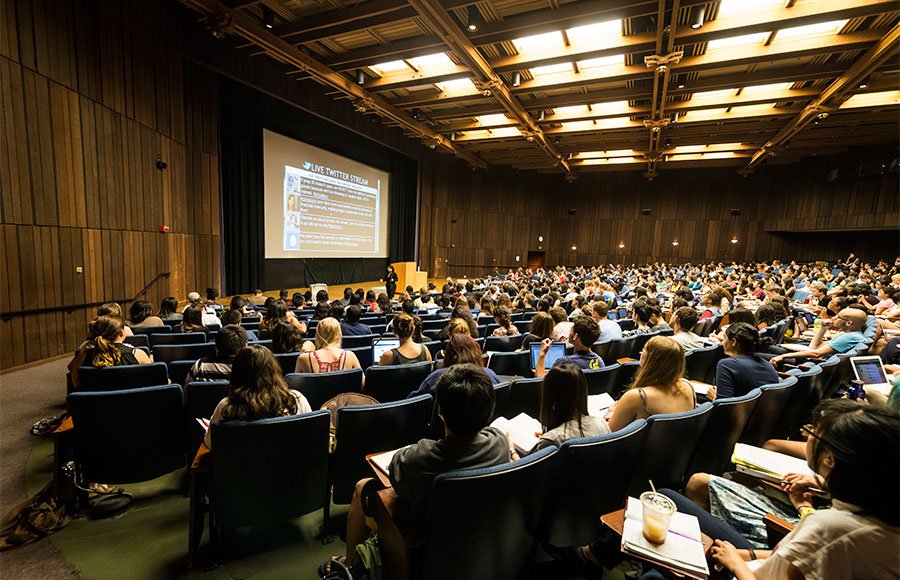President Barack Obama is proposing a challenge to American universities: Stop tuition hikes and raise graduation rates, or face major cuts to federal funding.

Obama introduced a series of proposals last week to overhaul federal funding for higher education, recommending a plan for new ratings that will assess universities on measures such as graduation rates, tuition costs and the number of students receiving federal grants. He hopes to release these ratings by the start of the 2015 academic year. Students attending colleges with higher ratings could eventually receive larger federal grants than students at colleges with lower ratings.
The president’s agenda is to reward universities that provide students with the greatest opportunities for success after graduation. It also attacks growing student debt by proposing a cap on federal loan payments at 10 percent of borrowers’ monthly income.
Some experts say the president’s proposals are unlikely to greatly affect the UC system, but the university is familiar with what Obama called the “soaring cost” of a college education in a speech last week. The average tuition and fees at U.S. four-year public universities have increased by more than 250 percent in the past three decades, according to a White House release. Meanwhile, the typical family income has increased by only about 16 percent in the same time frame.
According to Jesse Rothstein, an associate professor at the UC Berkeley Goldman School of Public Policy who specializes in higher education, Obama’s proposals mark a change in the way the federal government looks at its role in higher education.
“In the past, the federal government has provided research funding and financial aid with very little strings attached,” Rothstein said. “This is a real departure — that the federal government is trying to take steps in regards to doing more than just handing out money.”
Calling the proposals a “new direction” for higher education policy, Rothstein said the president’s initiative is chiefly aimed at for-profit private colleges, which he said receive large sums of federal funding despite low graduation rates. UC Berkeley, he said, will not see many changes even if the new ratings are implemented.
John Douglass, a fellow at the UC Berkeley Center for Studies in Higher Education, agreed that the proposed program is not likely to have a great effect on the UC system — in part due to the system’s high graduation rates. He did say, however, that the ratings could threaten schools that serve many low-income students but have high attrition rates. If low ratings lead to cuts in federal funding for such institutions, low-income students could be hurt instead of helped, he said.
Douglass said that while the federal government is making moves to fight tuition hikes and fees, it is the states that are ultimately responsible for tuition rates at public universities.
“What is the reason for tuition going up?” Douglass said. “Is it because operating costs are going up? At UC Berkeley, no. The other element is, where are the states? What is the funding formula that they want to get to? That is the ultimate place where the influence lies — state budgets.”
Fifty-two percent of UC students who graduated in 2012 took student loans during their time at the university. UC President Mark Yudof said in a statement that UC students who take out loans graduate with an average debt of about $7,000 less than the national average, which the White House estimates to be more than $26,000.
Still, that debt can feel substantial. Alex Lee, a UC Berkeley senior, says he will have more than $30,000 in loans to repay after graduation. He said Obama’s proposal to cap federal loan payments at 10 percent of borrowers’ monthly income could relieve some anxiety about paying for his education.
“It’s really such a heavy thing to weigh on my head,” Lee said. “I don’t feel like I can do much until I get rid of it. I feel like a 10 percent cap would be useful, because at least I would have a consistent basis to make my payments off of.”
Valerie Jameson, ASUC academic affairs vice president, said she hopes to see Obama’s plans for higher education gain credibility.
“President Obama is addressing an issue that is persistent in higher education: access,” Jameson said. “We are at a time where state funding of the UC system is at an all-time low. The proposals sound great in theory, but I definitely want to see the actual implementation piece.”





